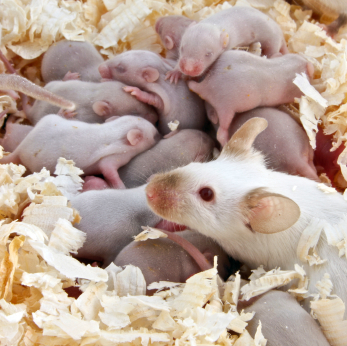 Imagine that you are sitting in your room when you smell cherries and you are suddenly, inexplicably afraid. Although odors can elicit strong emotional responses, you have no bad memories of cherries. What you don’t know is that your father did, and you have inherited his fear. Sound far fetched? Maybe not. A paper published in Nature Neuroscience found just such an inherited association in mice (1).
Imagine that you are sitting in your room when you smell cherries and you are suddenly, inexplicably afraid. Although odors can elicit strong emotional responses, you have no bad memories of cherries. What you don’t know is that your father did, and you have inherited his fear. Sound far fetched? Maybe not. A paper published in Nature Neuroscience found just such an inherited association in mice (1).
In the study, the authors conditioned mice to associate the odor of acetophenone (which smells something like cherries or almonds) with an unpleasant experience. The animals eventually came to shudder at the smell even when nothing unpleasant happened. When the offspring of these acetophenone-conditioned mice were exposed to acetophonene, they reacted much more strongly to the scent than mice that were not related to the conditioned mice. Going out one more generation, the ‘grandchildren’ of the conditioned mice also exhibited sensitivity to the scent of acetophenone. The authors also observed similar behavior in mice that were fathered by the conditioned mice through in vitro fertilization.
The effects of the conditioning went further than just changes in behavior. They were coupled with structural changes in regions of the brain associated with processing odors. These changes in brain structure were found in the conditioned mice as well as their offspring.
Conventional biological inheritance says that passing on DNA sequences is the only way to transmit biological information to offspring. Changes to these sequences happen slowly over many generations and would not explain the heritable changes seen in the acetophenone-conditioned mice and their offspring. Scientists have learned that biology can be influenced through heritable changes that alter gene expression but not the nucleotide sequences themselves. This phenomenon is called ‘epigenetics’. The best characterized epigenetic modification is DNA methylation, a reversible chemical modification of DNA that typically blocks gene transcription.
Could epigenetic changes explain the inherited scent sensitivity? The authors proposed that DNA methylation could explain the inherited effect they observed. They noted that the acetophenone-sensing gene in the sperm cells of the conditioned mice contained fewer methylation marks, which could have led to an increase in gene expression of the odor receptor gene. However, the mechanism by which scent-associated fear would influence sperm cells is still a mystery.
This is one of those studies that seem to generate more questions than answers. Do epigenetic changes explain the ‘inherited’ fear? How does the father’s experience result in these epigenetic changes in germ cells (if they are epigenetic), and how and why are these changes maintained from one generation to the next? As scientists, we want to know how it all links together, and those answers won’t come overnight. It is going to take time.
And that is one of the beautiful things about science. Every time we think we have it figured out, we dig a little deeper and it turns out that everything is more complicated, more intricate and way more amazing than we ever guessed.
Reference
- Dias, B. G. and Ressler, K. J. (2013) Parental olfactory experience influences behavior and neural structure in subsequent generations. Nat. Neurosci. 16, 146–53. Published online December 01, 2013.
For more information about epigenetics, you can read the Epigenetics Chapter of the Promega Protocols and Applications Guide.
